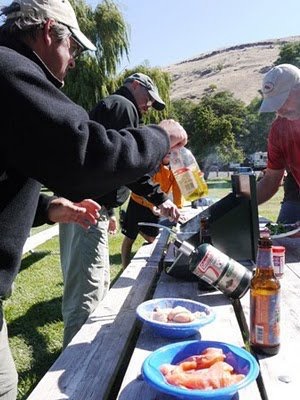Remembering Mark Schmidt | Molalla River Steward
Remembering Mark Schmidt
Mark Schmidt was one of Native Fish Society’s original River Stewards and the first recipient of the River Steward of the Year Award. Mark was one of the most welcoming and generous people I’ve ever met. Spending time with Mark meant exploring the Molalla, learning about its native fish, counting winter steelhead redds, and monitoring the temperatures of cold water tributaries. When I was new to conservation, Mark told me stories about stopping gravel mining operations slated for the floodplain and keeping untreated wastewater out of the Molalla River. Mark’s love of his homewaters and native fish was infectious; so many of us are doing this work as a direct result of his example and inspiration. Mark achieved, fundamentally, what we all as River Stewards and conservationists aspire to -- he left his homewaters better than he found it. Our staff and River Steward community dearly miss Mark and wish our sincerest condolences to his wife Diana Schmidt and all of Mark’s friends and family.
Below we've assembled a collection of memories of Mark, some of his great fish stories and photos from his life on the Molalla.
-- Mark Sherwood, Executive Director
Tom Derry Remembers Mark, He Was a Friend of Mine...
He was a friend if mine........
We met 15 years ago while protecting our river from a proposed gravel mine in the 5 year floodplain. We won.
Mark had a gentle spirit and loved life.
He was our teacher.
When Mark fished he turned into a heron. Our favorite times were spent fishing together. Our fishing days would start with me picking Mark up at his river house. No seat belts or drivers license required, this was our river. One day after fishing a number of pools we needed some lunch. We drove up to Toads gas station and bought 2 dozen greasy chicken wings and a six pack of beer. When we put this feast in front of us in the cab of my pickup we both looked at one another thinking we were the luckiest guys on earth!
This was our river.
Every time I look at the river I feel Marks presence. He will be missed immensely.
Peter Donahower Remembers Mark, Steelhead Fritters
The 2010 Native Fish Society River Steward Retreat was held in August at Deschutes State Park, near the Columbia confluence. I woke before dawn and headed east on I-84, to try and beat the sun. It was such a beautiful morning, I couldn’t help the temptation to stop along the way and flip a few flies. Shortly I had a chrome hatchery steelhead in the cooler and was back on the road. When I arrived at the campground, nobody else was there, and the sun was warming the grass, so I took a nap in my truck.
When I awoke, my dear friend and Molalla River Steward Mark Schmidt, was sitting on the picnic table next to my truck and sipping a beer. He turned and gave me that easy smile, simultaneously full of joy and mischief. Mark’s smile always bore a slight hint of wonder. When I told him I had fresh steelhead in the cooler, his smile widened and he cheered “We’ll make steelhead fritters! What kind of whisky do you like?” Then, off he went to The Dalles to buy the necessary ingredients, while I filleted and deboned the steelhead.
That evening, after most of the other folks had arrived and set up camp, Mark and I set up our camp oven cook station and the fun began. Fortunately, McKenzie River Steward Matt Stansbury had also found hatchery chrome earlier in the day, so we had plenty to go around. I cut the fillets into one inch wide strips, then Mark tossed them in Shake’n’Bake and we skillet fried them in olive oil. Soon we had a harmonious cadence going, with intermittent breaks to sip bourbon from plastic cups. It was a glorious time. Folks cycled back around for seconds and a few new arrivals got there just in time to share in the fun.
I will miss Mark’s spontaneous laughter, his view of the world and way of seeing into the unexplained. He had a knack for making others feel at ease and possessed a sharp wit that projected naturally and inspired me to find unexpected moments of peace. Mark Schmidt was the best kind of friend and a true wild fish advocate. The Molalla River, wild fish conservation and anyone who had the privilege of knowing him, will miss his presence.

Jason Koertge Remembers Mark
Just as the North Umpqua has Lee Spencer, the Molalla had Mark Schmidt. Always feels like I’m cheating on the river if I don’t stop in and see either each time I’m there.
On most visits to the Mo, it wasn’t too hard to con Mark into an afternoon fishing session. He was easy that way, and any time spent with him was treat. Our fishing quickly became secondary to the old stories. Mark had years of memories on that river, and I was in love with the love he had for the watershed. Sometimes one of us would hold a fish. More often, we’d end up somewhere high in the drainage, late season, walking creeks to see if we could find redds. If we were real lucky, we’d see a pair spawning. We’d hide in the trees and watch them for as long as was fair.
Many of those late afternoons would find us on the Pine Creek bridge, draining a tallboy on the tailgate and watching the light fade. Those are the moments Mark truly shined, his laughter infectious and his love of wild fish so true. He had an ease about him. I’ll miss those times most.
Last winter and the last time I’d see Mark, I’d finished a pool and headed toward his place for a visit. He had an old Ford pickup parked there in perpetuity, and I’d always tease him about whether it actually ran. Cresting the hill and dropping in toward the North Fork I noticed the truck pulling out, so I slowed up. Just as I was about to flag him down, I saw his face, and the smile of his beautiful bride Diana riding shotgun. The two looked so happy in love. It felt right to just keep driving.
A Fish Story
By Mark Schmidt
Twilight was upon the river. Out the window of my old house above the Molalla River, shafts of light filtered through the firs onto the current. The roiling water looked like it needed a few casts with my vintage Scott fly rod. I hurried down to the graveled spit separating the North Fork and main stem of the river. In the fading light, I flipped my fly out into the swirling confluence. My line settled into a swing through the holding water. I stood at the head of the drift, already immersed in the evening, watching a kingfisher fly past on his way downriver, when the line began to slip quietly through my fingers.
Maybe that day I had grown distracted by the familiar white sound of the river, the streamers of golden light slanting on the current, finding satisfaction in merely breathing the fresh air... And so, as the line was being pulled from my loop, it was a long second before I came awake to the realization, “Oh, my God, it’s a fish!” Then my reflexes took charge. I lifted the rod tip, and an overwhelming explosion of “wild’’ nearly jerked the rod from my hand.
It felt as though my line had gotten tangled around the bumper of the old Buick that was speeding at that moment down the river road. The line ripped through my grip, searing the crease of my index finger. The old Bauer reel whistled as the line screamed out through the guides. . .
The water was smooth and I could see her clearly--the slim pink line, and soft crimson of her cheek, the form and beauty of a classic wild fish.
After six runs, she began to tire. Soon, she allowed me to lift her enough to slip my hand down to the fly. I desired to measure her . . . but I simply pulled the fly free, and nudged her into the current . . . and she was gone.
I walked back up the trail to “The Riverhouse,” the old homestead that sheltered my family for 15 years and anchored my sense of place on the Molalla. Once it was not unusual to hook and land a Steelhead, which is best eaten fresh from the river or smoke-cured after hours over an Alder-wood fire. Now, hooking a Steelhead is uncommon. The rule is catch-and-release only, and smoked steelhead comes from the market. I can live with that. Without recovery of the species, the adventure cannot persist.
Why We Fish
By Mark Schmidt
That September, I hiked downriver from my old homestead on the Molalla River to a familiar pool. I held my single-handed Sage, with a McMillian’s “Steelhead Caddis” tied on a six-pound tippet. The sun was bright, the river was running full and clear. It was easy to see bottom at four to six feet, so you could see a fish move. The big fish had been feeding on spent Caddis flies for two months, and they remember.
We know they are here. Tom, my normally taciturn friend and neighbor, released one in at the Lower Heaven drift farther downstream. It was such an epic experience that even he couldn’t hide his glee. His eyes simply sparkled. That fish came to a fly, and after an extended struggle, to the gravel. It was estimated at around 14 pounds.
At the pool, I dropped the fly upstream, threw a big mend into it, and let it dead drift through the airy, bubbly, rip lines, until it swam naturally out of the mist and into the sunlight. Instantly I saw a tail, and then the silhouette of a big trout. He was drifting back with the fly, slipped up to it, and refused it as I spotted him. He was gone in a second, but I guessed the fish was a 16” – 18” resident. It made me suck in a little air.
Now, as long as we are presently standing together, in the sunshine, on one of the most beautiful, sunlit, steelhead pools in this solar system . . . let us cast again. And so, in this moment we are really fishing. We are dreaming, seeing that little trout’s big brother slip across the gravel and drift back with our fly. You know those times when you are fishing in the zone? Your whole body shifts into automatic predation mode . . . your cast is focused and perfect, and your mend soft and sure . . . time nearly stands still. The fly drops into the seam, and the rip pulls it down . . . the fly disappears, and you’re fishing blind. You hold your breath . . . and pay line out to feed the drift . . . you are actually feeling the take, way before it happens; anticipation. The electric moment.
The fly swims out into the sunshine, a baby steelhead flashes, turns away from it, and we let out a little air. Yes, this is why we fish.
Never too Cold
By Mark Schmidt
There are those rare days when the entire river system seems to say, “…it’s too cold to fish!”
Yet there are those of us who are deaf to any notion, any thought, any word which might exclude an opportunity to go streamside and drown feathers. Thankfully, I have a dear friend of such ilk. Tom called in this morning at 11:30 AM saying, “…hey, we’re going out aren’t we?” Well, it had stopped snowing for a moment, the water was up and colored nicely, and the thermometer was above 34 degrees F. If the fly line will slip through the guides on the rod without freezing, if there is water in the river, if we are at all alive, then well… “You bet we’re going” I said!
By the time we had found enough layers of clothes, and struggled into our waders, it was nearly 2:30 PM, the warmest, brightest hour of the day. The sunshine was breaking through the clouds, and snow was falling from the fir branches in big wet clumps, as we trudged down the trail to our chosen drift. Tom and I felt pretty warm and bright too, happy to be out, and hopeful that the wild winter fish might be willing this afternoon.
I began fishing at the head of the drift, Tom stepped into the river and began sweeping the long flat water below the slot. It took about me about twelve casts to get the fly in position to swing through the soft deep water. As soon as the fly slowed and began to swim out of the main current, there was a mild pull, and suddenly the fish was running across and downstream. She ran to the fast water then turned toward the sky, in one long, high leap, throwing ice water back into the clouds. From that moment on, she pulled hard, head down into the fast water. Very typical of our wild winter Steelhead. The struggle lasted only moments. Then she allowed us to coax her into the shallow water, where she lay over on her side and posed for photographs.
She measured 32” in length, 15 1/2” in girth. That computes to just more than 10 pounds.
The fly fell from her lip while she lay in the shallow water. I turned her back toward the river, and she found her way toward the current then raced away toward the deep water.
It is rare to find a fish during the cold months, even rarer still to find a wild winter Steelhead. There is no other fish which offers us the deep certainty that we have encountered a magnificent portion of creation. Though we have found ourselves capable of hatching and rearing fish which are reasonable facsimiles of God’s work, nothing compares to the power and soul of the genuine article. Nothing comes to the fly with such reckless abandon; nothing runs and leaps with such power and speed. No fish evokes such awe, such reverence. There is no substitute for our wild fish.



